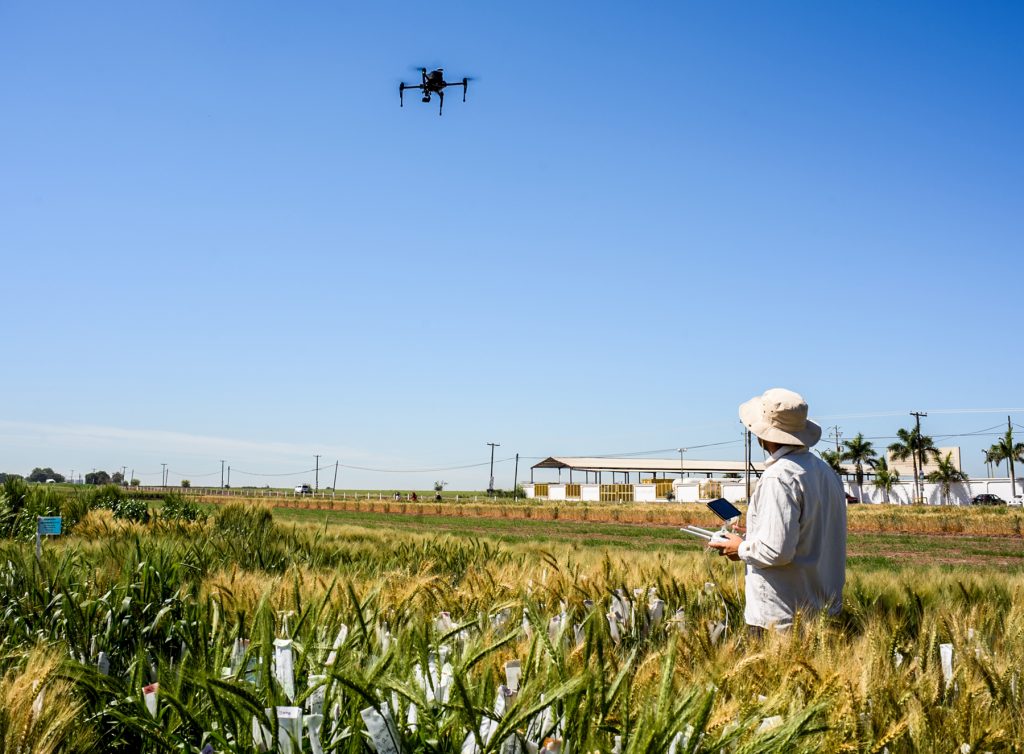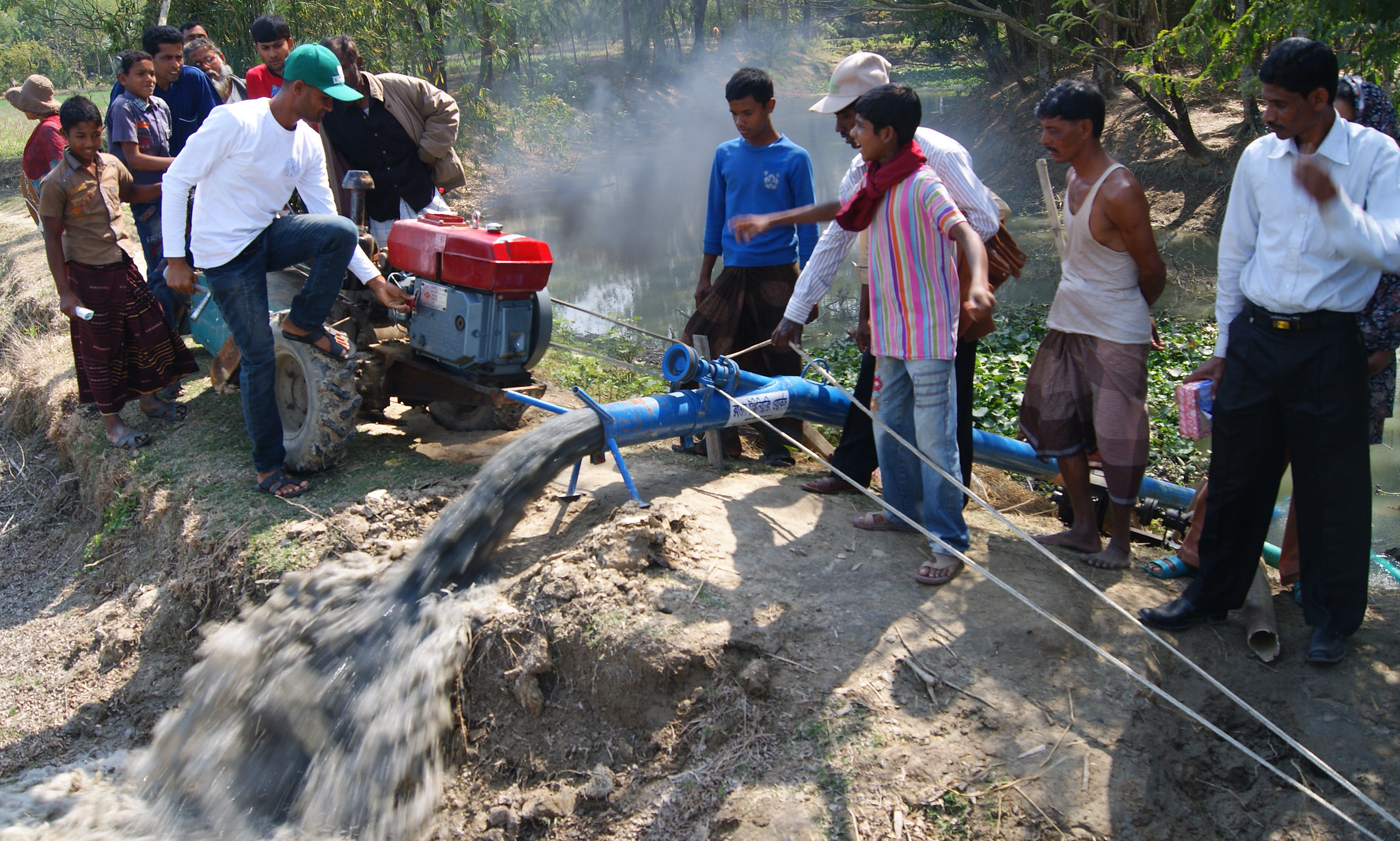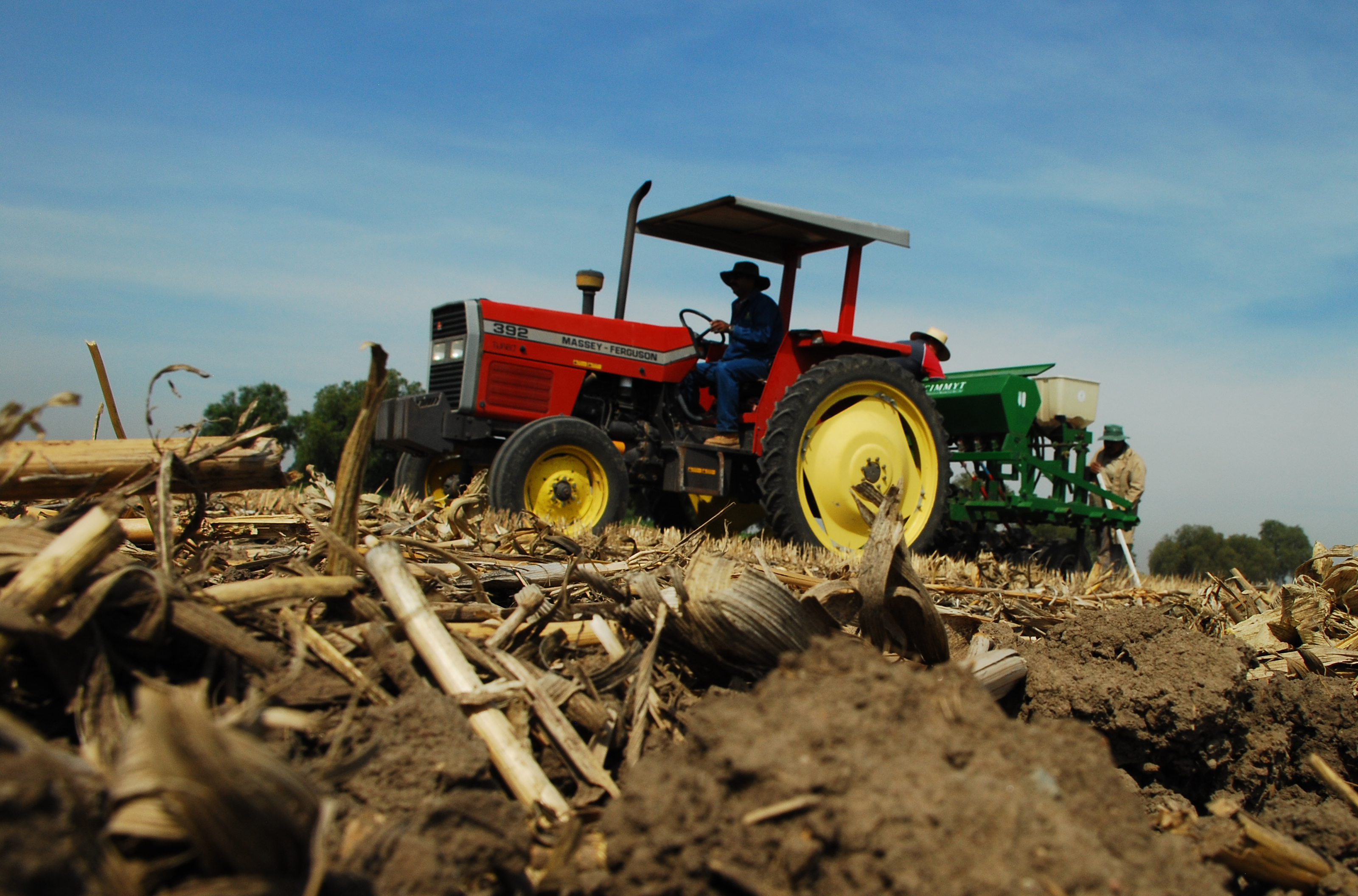Actualmente, en los campos de investigación de cultivos, es común ver drones u otras herramientas de detección de alta tecnología que recopilan datos de alta resolución en una amplia gama de rasgos, desde la simple medición de la temperatura hasta la compleja reconstrucción en 3D.
Este enfoque tecnológico para recopilar información precisa sobre los rasgos de las plantas, conocido como fenotipado, se está volviendo omnipresente, pero según los expertos del Centro Internacional de Mejoramiento de Maíz y Trigo (CIMMYT) y otras instituciones de investigación, los mejoradores pueden beneficiarse mucho más de estas herramientas cuando se usan correctamente.
En un nuevo artículo en Plant Science, los investigadores del CIMMYT describen las diferentes formas en que el fenotipado puede ayudar al mejoramiento — desde la selección a gran escala hasta la caracterización fisiológica detallada de los rasgos clave — y por qué esta metodología es fundamental para la mejora de los cultivos.
«Si bien, ha sido objeto de debate en el pasado, la inversión adicional para el fenotipado es cada vez más aceptada para capitalizar los desarrollos recientes en genómica de cultivos y modelos de predicción», explican los autores.
Su análisis considera diferentes contextos para el fenotipado, incluido el mejoramiento, la exploración de recursos genéticos, la investigación para lanzar recursos nuevos de mejoramiento, y cómo estas diferentes categorías de fenotipado se aplican a cada uno. Algunas de las herramientas y reglas generales se aplican igualmente al fenotipado para el análisis genético de rasgos complejos y el descubrimiento de genes.
Los autores sugieren que los mejoradores inviertan en herramientas de fenotipado, particularmente para mejorar cultivos que soporten climas más cálidos y severos. Sin embargo, la adopción a gran escala de métodos de fenotipado sofisticados solo ocurrirá si las nuevas técnicas agregan eficiencia y efectividad.
De este modo, el fenotipado «accesible para los mejoradores» debería complementar los enfoques de mejoramiento existentes al aumentar de manera rentable el rendimiento durante la selección segregante y agregar nuevas fuentes de rasgos complejos a los bloques de cruzamiento. Con esto en mente, se deben aplicar criterios estrictos antes de incorporar nuevas características o protocolos de fenotipado en el mejoramiento convencional.
Lea el artículo completo en Plant Science: Breeder friendly phenotyping.

Otras publicaciones recientes del CIMMYT:
- Genome-wide association study to identify genomic regions influencing spontaneous fertility in maize haploids. 2019. Chaikam, V., Gowda, M., Nair, S.K., Melchinger, A.E., Prasanna, B.M. In: Euphytica v. 215, no. 8, art. 138.
- Adapting irrigated and rainfed wheat to climate change in semi-arid environments: management, breeding options and land use change. 2019. Hernandez-Ochoa, I.M., Pequeno, D.N.L., Reynolds, M.P., Md Ali Babar, Sonder, K., Molero, A., Hoogenboom, G., Robertson, R., Gerber, S., Rowland, D.L., Fraisse, C.W., Asseng, S. In: European Journal of Agronomy.
- 3.Integrating genomic resources to present full gene and putative promoter capture probe sets for bread wheat. 2019. Gardiner, L.J., Brabbs, T., Akhunova, A., Jordan, K., Budak, H., Richmond, T., Sukhwinder-Singh, Catchpole, L., Akhunov, E., Hall, A.J.W. In: GigaScience v. 8, no. 4, art. giz018.
- Rethinking technological change in smallholder agriculture. 2019. Glover, D., Sumberg, J., Ton, G., Andersson, J.A., Badstue, L.B. In: Outlook on Agriculture v. 48, no. 3, p. 169-180.
- Food security and agriculture in the Western Highlands of Guatemala. 2019. Lopez-Ridaura, S., Barba‐Escoto, L., Reyna, C., Hellin, J. J., Gerard, B., Wijk, M.T. van. In: Food Security v. 11, no. 4, p. 817-833.
- Agronomic, economic, and environmental performance of nitrogen rates and source in Bangladesh’s coastal rice agroecosystems. 2019. Shah-Al Emran, Krupnik, T.J., Kumar, V., Ali, M.Y., Pittelkow, C. M. In: Field Crops Research v. 241, art. 107567.
- Highlights of special issue on “Wheat Genetics and Breeding”. 2019. He Zhonghu, Zhendong Zhao, Cheng Shun-He In: Frontiers of Agricultural Science and Engineering v. 6, no. 3, p. 207-209.
- Progress in breeding for resistance to Ug99 and other races of the stem rust fungus in CIMMYT wheat germplasm. 2019. Bhavani, S., Hodson, D.P., Huerta-Espino, J., Randhawa, M.S., Singh, R.P. In: Frontiers of Agricultural Science and Engineering v. 6, no. 3, p. 210-224.
- China-CIMMYT collaboration enhances wheat improvement in China. 2019. He Zhonghu, Xianchun Xia, Yong Zhang, Zhang Yan, Yonggui Xiao, Xinmin Chen, Li Simin, Yuanfeng Hao, Rasheed, A, Zhiyong Xin, Zhuang Qiaosheng, Ennian Yang, Zheru Fan, Yan Jun, Singh, R.P., Braun, H.J. In: Frontiers of Agricultural Science and Engineering v. 6. No. 3, p. 233-239.
- International Winter Wheat Improvement Program: history, activities, impact and future. 2019. Morgounov, A.I., Ozdemir, F., Keser, M., Akin, B., Payne, T.S., Braun, H.J. In: Frontiers of Agricultural Science and Engineering v. 6, no. 3, p. 240-250.
- Genetic improvement of wheat grain quality at CIMMYT. 2019. Guzman, C., Ammar, K., Velu, G., Singh, R.P. In: Frontiers of Agricultural Science and Engineering v. 6, no. 3, p. 265-272.
- Comments on special issue on “Wheat Genetics and Breeding”. 2019. He Zhonghu, Liu Xu In: Frontiers of Agricultural Science and Engineering, v. 6. No. 3, p. 309.
- 12.Spectral reflectance indices as proxies for yield potential and heat stress tolerance in spring wheat: heritability estimates and marker-trait associations. 2019. Caiyun Liu, Pinto Espinosa, F., Cossani, C.M., Sukumaran, S., Reynolds, M.P. In: Frontiers of Agricultural Science and Engineering, v. 6, no. 3, p. 296-308.
- Beetle and maize yield response to plant residue application and manual weeding under two tillage systems in northern Zimbabwe. 2019. Mashavakure, N., Mashingaidze, A.B., Musundire, R., Gandiwa, E., Thierfelder, C., Muposhi, V.K. In: Applied Soil Ecology v. 144, p. 139-146.
- Optimizing dry-matter partitioning for increased spike growth, grain number and harvest index in spring wheat. 2019. Rivera Amado, A.C., Trujillo, E., Molero, G., Reynolds, M.P., Sylvester Bradley, R., Foulkes, M.J. In: Field Crops Research v. 240, p. 154-167.
- Small businesses, potentially large impacts: the role of fertilizer traders as agricultural extension agents in Bangladesh. 2019. Mottaleb, K.A., Rahut, D.B., Erenstein, O. In: Journal of Agribusiness in Developing and Emerging Economies v. 9, no. 2, p. 109-124.
- Heterogeneous seed access and information exposure: implications for the adoption of drought-tolerant maize varieties in Uganda. 2019. Simtowe, F.P., Marenya, P. P., Amondo, E., Regasa, M.W., Rahut, D.B., Erenstein, O. In: Agricultural and Food Economics v. 7. No. 1, art. 15.
- Hyperspectral reflectance-derived relationship matrices for genomic prediction of grain yield in wheat. 2019. Krause, M., Gonzalez-Perez, L., Crossa, J., Perez-Rodriguez, P., Montesinos-Lopez, O.A., Singh, R.P., Dreisigacker, S., Poland, J.A., Rutkoski, J., Sorrells, M.E., Gore, M.A., Mondal, S. In: G3: Genes, Genomes, Genetics v.9, no. 4, p. 1231-1247.
- Unravelling the complex genetics of karnal bunt (Tilletia indica) resistance in common wheat (Triticum aestivum) by genetic linkage and genome-wide association analyses. 2019. Emebiri, L.C., Sukhwinder-Singh, Tan, M.K., Singh, P.K., Fuentes Dávila, G., Ogbonnaya, F.C. In: G3: Genes, Genomes, Genetics v. 9, no. 5, p. 1437-1447.
- Healthy foods as proxy for functional foods: consumers’ awareness, perception, and demand for natural functional foods in Pakistan. 2019. Ali, A., Rahut, D.B. In: International Journal of Food Science v. 2019, art. 6390650.
- Northern Himalayan region of Pakistan with cold and wet climate favors a high prevalence of wheat powdery mildew. 2019. Khan, M.R., Imtiaz, M., Farhatullah, Ahmad, S., Sajid Ali.In: Sarhad Journal of Agriculture v. 35, no. 1, p. 187-193.
- Resistance to insect pests in wheat—rye and Aegilops speltoides Tausch translocation and substitution lines. 2019. Crespo-Herrera, L.A., Singh, R.P., Sabraoui, A., Moustapha El Bouhssini In: Euphytica v. 215, no. 7, art.123.
- Productivity and production risk effects of adopting drought-tolerant maize varieties in Zambia. 2019. Amondo, E., Simtowe, F.P., Rahut, D.B., Erenstein, O. In: International Journal of Climate Change Strategies and Management v. 11, no. 4, p. 570-591.
- Review: new sensors and data-driven approaches—A path to next generation phenomics. 2019. Roitsch, T., Cabrera-Bosquet, L., Fournier, A., Ghamkhar, K., Jiménez-Berni, J., Pinto Espinosa, F., Ober, E.S. In: Plant Science v. 282 p. 2-10.
- Accountability mechanisms in international climate change financing. 2019. Basak, R., van der Werf, E. In: International Environmental Agreements: Politics, Law and Economics v. 19, no. 3, p. 297-313.
- Enhancing the rate of genetic gain in public-sector plant breeding programs: lessons from the breeder’s equation. 2019. Cobb, J.N., Juma, R.U., Biswas, P.S., Arbelaez, J.D., Rutkoski, J., Atlin, G.N., Hagen, T., Quinn, M., Eng Hwa Ng. In: Theoretical and Applied Genetics v. 132, no. 3, p. 627-645.



 Igualdad de género, juventud e inclusión social
Igualdad de género, juventud e inclusión social 